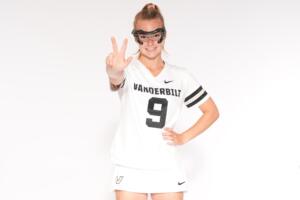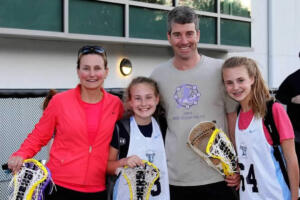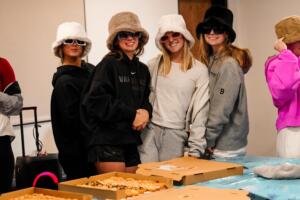A Lasting Legacy
by Graham HaysThree decades after her mom and aunt helped launch the lacrosse program, Katherine Ernst is the living legacy of opportunity
NASHVILLE, Tenn. — Every first-year student hopes to find their people—that community within a community that will shape not just a college experience but the life that follows.
Katherine Ernst was fortunate. Her people found her first.
As Ernst and her mom walked toward their West End hotel the day before the first-year student-athlete moved into campus housing, a car crowded with young women pulled alongside. Windows down, the occupants excitedly called Katherine’s name and urged her to come with them. Ernst recognized the seniors on the lacrosse team, but at that point, she barely knew Kirkland from McGugin.
Before she could hesitate, her mom, Caroline Ernst, urged her to go. Katherine’s teammates took her to the house where many seniors lived, literally welcoming her with open arms and hugs and introductions. They showed her around and encouraged her to hang out and later took her back to her hotel. Saturday, Ernst begins her second season as the Commodores host Central Michigan. The past 18 months have been a whirlwind of change on and off the field, but from that first encounter on the sidewalk, she’s always had her people.
“There have been moments where I’m sitting in a room filled with girls on my team, and I just feel like I’m so loved and supported and can go to any of them for anything,” Ernst said. “I would say I have a great relationship with each girl on the team, and they’re all for different things. I know who to call if I need help organizing my schedule, help with econ, if I need to go get dinner and talk through life scenarios. It’s an incredible culture to be a part of.”
And the mother she ditched that late summer day? Caroline Ernst couldn’t have been happier as she watched the car carrying her daughter drive off into the distance. She didn’t know the address of Katherine’s destination, but as an alumna she knew where she was going.
“What a wonderful welcome to campus,” Caroline said. “Vanderbilt is an open, warm campus, and I think it’s a campus where you can find your people.”
Every parent hopes they have prepared a child for that moment, have equipped them with the skills and values to find their people. But Caroline did more than that, and it started way before Katherine was born.
Caroline and Leigh Ernst Freistedt, Katherine’s aunt, were part of the 1990s club team that lobbied for and supported lacrosse’s introduction as a varsity sport. Watching her daughter leave with her new teammates that day, Caroline hadn’t prepared just Katherine for the moment. She and her teammates and friends had helped prepare Vanderbilt.
“I feel like I’m kind of living out my mom’s legacy,” Katherine said. “She gets to look at me and say that, in a way, she paved the way for me to be able to be at Vanderbilt for a D-I lacrosse program. And my aunt did, too, and all of their friends did. I get to be here because there were a bunch of people back then who said, ‘Hey, this should be a D-I program.’”

"Knowing about all the people who worked so hard on Title IX and to make all of these things happen for my generation is so important for us to acknowledge.”
Katherine Ernst
Pioneers in the Family
Caroline’s husband, Katherine’s dad, is Leigh’s younger brother. Though Peter Ernst’s time with the Vanderbilt men’s club lacrosse team overlapped with Caroline’s time with the women’s club team, the future spouses were just passing acquaintances until they reconnected after graduation—at the wedding of two of their former teammates.
The first connections between families were a club team and Caroline and Leigh’s roots.
Growing up in the Philadelphia area, Caroline attended the all-girls Agnes Irwin School. A four-sport star, she was recognized as the school’s outstanding athlete one year—the same award that Katherine would later win for her multi-sport efforts at the school.
Leigh followed a similar path growing up in Bethesda, Maryland. Initially faced with few options other than forcing her way onto boys’ athletic teams at a coed private school in the Washington, D.C., area, she moved in middle school to the all-girls Holton-Arms School. Lacrosse was a late addition to her athletic repertoire, but she took to it—and excelled—to the extent that she drew interest from top-level Ivy League Division I programs. She chose Brown, eventually earning All-Ivy honors as a senior in 1993.
A year later, Leigh began law school at Vanderbilt and soon found her way to the club lacrosse team as an athlete and volunteer coach during Caroline’s senior year. Practicing on a rather rugged field on the edge of campus, driving themselves to games, taking care of their own uniforms and gear, they played against club teams from the likes of Duke (which added varsity lacrosse in 1996) and North Carolina (1994).
“It was such a different day back then,” Caroline said. “We were a bunch of New Englanders, mid-Atlantic folks that just liked to play lacrosse. It was just a talented group of kids. But we were kind of a little like riffraff, right? We had a team that we just pulled together.”

The Ernsts (from L to R): Caroline, Sarah, Peter and Katherine in middle school.
The Road to Division I
Leigh was at Brown in 1993 when gymnastics student-athlete Amy Cohen sued the school for violating Title IX, alleging that cutting two women’s varsity sports disproportionately affected a historically underrepresented group. The decision in favor of the plaintiffs, which the university appealed up to the U.S. Supreme Court in Cohen v. Brown, “set the standard for determining a school’s compliance with Title IX in the area of athletics.” No longer could schools argue that greater resources for men’s sports were justified by greater interest in athletic offerings from male student-athletes.
Even as Brown’s appeals wound through the courts during the 1990s, effects of the lawsuit were evident as universities across the country greatly expanded offerings for women’s sports. In the SEC alone, soccer and softball became championship sports during the decade. Even in lacrosse, where roughly 90 percent of Division I programs are still in the Eastern time zone, 21st century NCAA champions Boston College, Duke and North Carolina all started their varsity programs in the 1990s, and present-day juggernaut Northwestern revived its program in 2002.
During this period, the late Paul Hoolahan, Vanderbilt’s athletic director from 1990 until 1996, invited Leigh to meet with him and lend her perspective as a former Division I lacrosse student-athlete who also was familiar with the state of the Vanderbilt club team. To this day, Leigh remains actively involved in Title IX education and litigation, including working pro bono with former Vanderbilt classmate Buzz Frahn on a recent landmark case involving scholastic sports in Hawaii. So, it’s with a hard-earned rueful chuckle that she recalls the rare invitation to good-faith dialogue.
“I didn’t have an agenda when I went in there. I wasn’t trying to get anything from the school,” Leigh said. “And I think it’s the only time that I’ve successfully had a conversation with an athletic director where, walking out of the room, we ended up doing something that I thought was great for the university.”
The only downside, upon learning Vanderbilt would indeed add lacrosse beginning with the 1996 season, was having to explain to coaches that she had already exhausted her NCAA eligibility.
Caroline and Leigh are quick to note that they were supporting figures in the effort to lobby for lacrosse at Vanderbilt. They reserve the lion’s share of credit for pioneering peers like Lyle Davis (at whose wedding Caroline and Peter reconnected). But there’s a reason that Katherine knows the story of her mom carrying paperwork in support of the effort to the Athletics offices. There’s a reason that such moments lodged in Caroline’s memory, and why she told the stories to her daughters. It’s also why, despite potentially missing out on a Division I experience herself by only a couple of years, she doesn’t feel shortchanged by her own time in lacrosse.
“You didn’t know what you were missing out on,” Caroline said. “In fact, what you felt was this great sense of accomplishment. It was the idea that we’re going to continue to see this trend of women’s sports receiving more recognition and more of the spotlight because they deserve it. So, I didn’t feel left out. It was more a huge sense of ‘look what we built.’”
It was a bonus that her own daughter would be among the beneficiaries.

Teammates, from L to R: Sammy Nuchow, Alex Gladding, Rocky McCauley, Katherine Ernst.
Katherine’s Opportunity
When Katherine arrived at Vanderbilt, she didn’t have to lobby for the opportunity to compete in Division I. But she did have to learn how to compete for a draw.
Even for an accomplished athlete from the lacrosse hotbed of the Northeast, where her high school games were the biggest thing on the school sporting calendar, adjusting to Division I was a challenge. Everyone had been a high school star. Everything happened faster. Rules were slightly different. And even seemingly simple acts came with nuances worthy of a dissertation. Katherine is among those who take draws at the start of each half or after a goal, the exercise similar to a hockey face-off but of even greater significance in a sport in which possession is paramount—and precious.
With the help of then-senior Megan Mangines, the same person who was behind the wheel of the car full of Commodores that collected Katherine that summer day, Katherine gradually learned every small intricate trick and technique. And then how to stop slowing down the process by thinking about every step.
“It was definitely technical in high school, but there are so many different techniques I learn here—about the release of the stick, when you break from the other person’s stick,” Katherine said. “That was a learning curve for me, but it was an interesting learning curve because the girls on the team helped me. Megan taught me how to do the draw, and she would sit there with me and we’d go over a ton of different things. I could ask her any question.”
She may not need to control a draw after she graduates, but that willingness to learn, discipline to study, collaborative spirit and confidence to ask questions? Those are reasons that employers look favorably on hiring former student-athletes, and why studies show former student-athletes thriving at elevated rates.
That’s part of the opportunity of college athletics. In Vanderbilt’s Class of 2023 student-athletes, 16 percent pursued professional sports. But 75 percent of them had already accepted jobs or been accepted in graduate programs at the time of Commencement. Hand in hand with pursuing competitive excellence, and the current lacrosse team’s conference and postseason aspirations, that opportunity is why so many worked so tirelessly for so long.
“I’m very excited that she’s there,” Leigh said of her niece. “The only thing I did was perhaps help facilitate there being a team in place. But again, a lot of how that transpired was a result of tremendous efforts by other people, whether that’s Amy Cohen or all the women that were playing lacrosse at Vanderbilt before I even showed up.”
Family history and the roots of the lacrosse program aren’t topics of everyday conversation among Katherine and her teammates. They’re busy living the present—very busy, given Vanderbilt’s particular demands. Nor should remembering and sharing the significance of that history be their obligation alone. But it’s not surprising that a recent family Thanksgiving dinner featured a lively discussion about not just winning draws or Vanderbilt’s schedule this season but also Title IX and the still-considerable gap between its vision and reality.
The story of Vanderbilt lacrosse is the story of women’s sports in the United States. And through Katherine, it’s living history.
“I feel like you could totally go through college lacrosse without batting an eye at all the people who allowed you to be where you are and gave you all the resources,” Katherine said. “But knowing about all the people who worked so hard on Title IX and to make all of these things happen for my generation is so important for us to acknowledge.”
All of those people are her people. Some of them just happen to be family.
